|
De Amerikaanse schrijver John Steinbeck werd geboren in Salinas, Californië, op 27 februari 1902. Zie ook alle tags voor John Steinbeck op dit blog.
Uit: Travels with Charley
« The next passage in my journey is a love affair. I am in love with Montana. For other states I have admiration, respect, recognition, even some affection, but with Montana it is love, and it’s difficult to analyze love when you’re in it. Once, when I raptured in a violet glow given off by the Queen of the World, my father asked me why, and I thought he was crazy not to see. Of course I know now she was a mouse-haired, freckle-nosed, scabby-kneed little girl with a voice like a bat and the loving kindness of a gila monster, but then she lighted up the landscape and me. It seems to me that Montana is a great splash of grandeur. The scale is huge but not overpowering. The land is rich with grass and color, and the mountains are the kind I would create if mountains were ever put on my agenda. Montana seems to me to be what a small boy would think Texas is like from hearing Texans. Here for the first time I heard a definite regional accent unaffected by TV-ese, a slow-paced warm speech. It seemed to me that the frantic bustle of America was not in Montana. Its people did not seem afraid of shadows in a John Birch Society sense. The calm of the mountains and the rolling grasslands had got into the inhabitants. It was hunting season when I drove through the state. The men I talked to seemed to me not moved to a riot of seasonal slaughter but simply to be going out to kill edible meat. Again my attitude may be informed by love, but it seemed to me that the towns were places to live in rather than nervous hives. People had time to pause in their occupations to undertake the passing art of neighborliness.
I found I did not rush through the towns to get them over with. I even found things I had to buy to make myself linger. In Billings I bought a hat, in Livingston a jacket, in Butte a rifle I didn’t particularly need, a Remington bolt-action .22, secondhand but in beautiful condition."
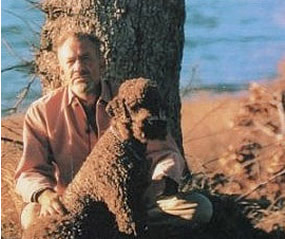
John Steinbeck (27 februari 1902 - 20 december 1968)
Hier met Charley
De Britse dichter en schrijver Lawrence George Durrell werd geboren op 27 februari 1912 in Jalandhar in India. Zie ook alle tags voor Lawrence Durrell op dit blog.
Uit: Spirit Of Place: Letters And Essays On Travel.
“You write,” says a friendly critic in Ohio, “as if the landscape were more important than the characters.” If not exactly true, this is near enough the mark, for I have evolved a private notion about the importance of landscape, and I willingly admit to seeing “characters” almost as functions of a landscape. This has only come about in recent years after a good deal of travel—though here again I doubt if this is quite the word, for I am not really a “travel-writer” so much as a “residence-writer.” My books are always about living in places, not just rushing through them. But as you get to know Europe slowly, tasting the wines, cheeses and characters of the different countries you begin to realize that the important determinant of any culture is after all—the spirit of place. Just as one particular vineyard will always give you a special wine with discernible characteristics so a Spain, an Italy, a Greece will always give you the same type of culture—will express itself through the human being just as it does through its wild flowers. We tend to see “culture” as a sort of historic pattern dictated by the human will, but for me this is no longer absolutely true. I don’t believe the British character, for example, or the German has changed a jot since Tacitus first described it; and so long as people keep getting born Greek or French or Italian their culture-productions will bear the unmistakable signature of the place. »
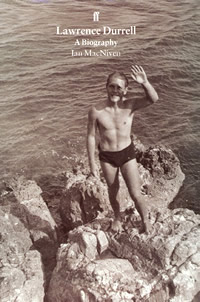
Lawrence Durrell (27 februari 1912 – 7 november 1990)
Cover biografie
De Canadese dichter, schrijver en essayist André Roy werd geboren op 27 februari 1944 in Montréal. Zie ook alle tags van André Roy op dit blog.
C’est encore la nuit
C’est encore la nuit,
le rêve actif,
la machine de l’action;
la nuit dans les forêts, les déserts, les villes.
J’avais rêvé à deux mondes :
un, visible et mortel;
un autre, invisible avec des fantômes
fatigués dès leur naissance.
Je regarde, je vois la danse du temps,
les criminels revenus durant la nuit.
C’est plein, c’est lumière
C’est plein, c’est lumière;
éclairage debout,
caméra bougeant dans ma tête.
Toi cœur,
toi acte d’humain contre moi.
Les paysages se transforment
pour être pareils à nos sentiments,
pour les rêves que nous voulons parfaire.
Le vent, le brouillard, l’homme du lac.
Le drame des étoiles est d’être fixées aux ténèbres.
Les durs désirs des étrangers que nous sommes
quand nous grandissons.
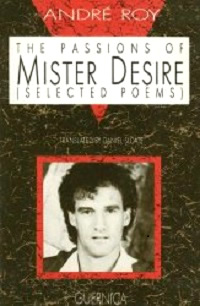
André Roy (Montréal, 27 februari 1944)
Cover
De Amerikaanse dichter Henry Wadsworth Longfellow werd geboren in Portland, Maine, op 27 februari 1807. Zie ook alle tags voor Henry Longfellow op dit blog.
Children
Come to me, O ye children!
For I hear you at your play,
And the questions that perplexed me
Have vanished quite away.
Ye open the eastern windows,
That look towards the sun,
Where thoughts are singing swallows
And the brooks of morning run.
In your hearts are the birds and the sunshine,
In your thoughts the brooklet's flow,
But in mine is the wind of Autumn
And the first fall of the snow.
Ah! what would the world be to us
If the children were no more?
We should dread the desert behind us
Worse than the dark before.
What the leaves are to the forest,
With light and air for food,
Ere their sweet and tender juices
Have been hardened into wood, --
That to the world are children;
Through them it feels the glow
Of a brighter and sunnier climate
Than reaches the trunks below.
Come to me, O ye children!
And whisper in my ear
What the birds and the winds are singing
In your sunny atmosphere.
For what are all our contrivings,
And the wisdom of our books,
When compared with your caresses,
And the gladness of your looks?
Ye are better than all the ballads
That ever were sung or said;
For ye are living poems,
And all the rest are dead.
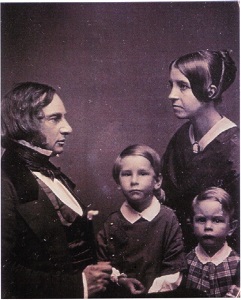
Henry Longfellow (27 februari 1807 - 24 maart 1882)
Het gezin Longfellow
De Duitse schrijfster en dichteres Elisabeth Borchers werd geboren in Homberg op 27 februari 1926. . Zie ook alle tags voor Elisabeth Borchers op dit blog.
Ende des Sommers
Wir haben uns lange genug
herumgetrieben
jetzt fällt die Sonne
in Ohnmacht
sie kann nicht mehr
Die Bäume hören auf
die Welle kommt nicht mehr
wie gewöhnlich sind die Dinge geworden
wie gewöhnlich.
Die Wette war ich eingegangen
dass dieser Sommer bliebe
Umzug
Ich räume das Haus
die Zimmer, die Treppen
die Jahre, Jahrzehnte
die Tage und Nächte
die Freunde, die Feinde
die Tassen, die Teller
die Kissen, die Decken
den Himmel, die Hölle
die Gräber
ich räume und räume
den Winter, den Sommer
den Wind und das Wetter.

Elisabeth Borchers (27 februari 1926 – 25 september 2013)
De Amerikaanse schrijver James Thomas Farrell werd geboren op 27 februari 1904 in Chicago. Zie ook alle tags voor James T. Farrell op dit blog.
Uit: Young Lonigan
“School meant Bertha, and Bertha should have been put away long ago, where she could kneel down and pray herself to death, because she was old and crabby and always hauling off on somebody; it was a miracle that a person as old as Bertha could sock as hard or holler as loud as she could; even Sister Bernadette Marie, who was the superior and taught the seventh- and eighth-grade girls in the next room, sometimes had to come in and ask Bertha to make less noise, because she couldn’t teach with all that racket going on; but telling Bertha not to shout was like telling a bull that it had no right to see red. And smart guys, like Jim Clayburn, who did his homework every night, couldn’t learn much from her. And school meant Dan and Bill Donoghue and Tubby and all the guys in his bunch, and you couldn’t find a better gang of guys to pal with this side of Hell. And it meant going to mass in the barn-like church on the first floor, every morning in Lent, and to stations of the cross on Friday afternoons; stations of the cross were always too long unless Father Doneggan said them; and marching on Holy Thursday in church with a lily in your hand, and going to communion tired Sunday of every month at the eight o’clock mass with the boys’ sodality. It meant goofy young Danny O’Neill, the dippy punk who couldn’t be hurt or made cry, no matter howl he was socked, because his head was made of hard stuff like iron and ivory and marble. It meant Vinc Curley, who had water on the brain, and the doctors must have taken his brains out, drowned and dead like a dead fish, that time they were supposed to have taken a quart of water from his oversized bean. The kids in Vinc’s class said that Sister Cyrilla used to pound him on the bean with her clapper, and he’d sit there yelling he was going to tell his mother; and it was funny, and all the kids in the room laughed their guts out.”
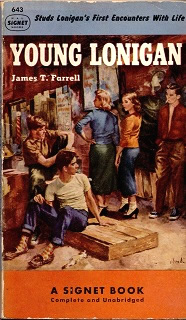
James T. Farrell (27 februari 1904 – 22 augustus 1979)
Cover
Zie voor nog meer schrijvers van de 27e februari ook mijn blog van 27 februari 2012 deel 2 en eveneens deel 3.
27-02-2015 om 18:36
geschreven door Romenu 
Tags:John Steinbeck, Lawrence Durrell, André Roy, Henry Longfellow, Elisabeth Borchers, James T. Farrell, Romenu
|

